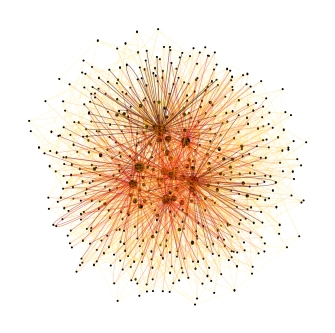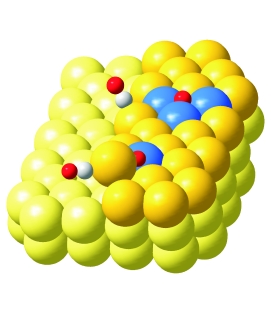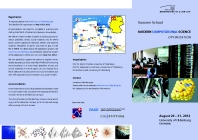Modern Computational Science - Summer School
4th International Summer School on
MODERN COMPUTATIONAL SCIENCE
Optimization
August 20-31, 2012, Oldenburg, Germany
Funded by the German Academic Exchange Service (DAAD)
and the Federal Foreign Office
Download of Poster and Flyer:
Overview
Optimization algorithms lie at the heart of many problems in Pure and Applied Science. Well-known examples are the electronic structure of molecules and compounds, the optimization of energy grids and other networks, the design of machine parts and workpieces, or the three-dimensional geometric shape of complex biomolecules, to name just a few. Advanced and powerful optimization techniques open up new possibilities for numerically tackling these and many other problems. Conversely, a deeper understanding of natural systems often leads to the development of new optimization methods (like, e.g., genetic algorithms) which may subsequently prove to be extremely useful in totally different fields. One of the aims of this Summer School is to give the participants an idea of the theory and practice of state-of-the-art numerical optimization methods, as exemplified by applications to current research topics that will be presented by renowned international experts.
The second, equally important goal is to provide a thorough introduction into some of the basic concepts and techniques of Scientific Computing, like algorithms and data structures, software engineering, data analysis, numerical simulations, etc. While the importance of computational methods has grown steadily over the past decades and continues to grow, these methods are not always adequately reflected in the curricula of many university programs. We hope that the present Summer School may help to improve on this situation.
Finally, participants will have a chance to strengthen their knowledge in hands-on computer practicals that complement the lectures.
The Summer School addresses students (from advanced undergraduate level
onwards) of Biology, Chemistry, Computer Science, Engineering, Mathematics,
Physics, and related fields.
All participants should have at least a little experience
with one higher programming language, like C/C++ or Fortran.
Participants who attended all lectures and tutorials
can earn 4 ECTS credit points and will be handed out
a certicificate at the end of the School.
We would also like to draw your attention to the book
Moreover, each participant will receive a volume of Lecture Notes (edited by R. Leidl and A.K. Hartmann).
Topics
The first week will be mainly devoted to the fundamentals of Scientific Computing and to an introduction into modern optimization algorithms. More specialized topics will be dealt with in the second week. Subjects of the Summer School include (but are not limited to):
- Fundamentals: software engineering, data analysis, basic numerical optimization methods, Monte Carlo simulations, complexity theory
- Advanced optimization methods: combinatorial optimization in bioinformatics, nature-inspired optimization, interval methods
- Applications: protein folding, quantum chemistry, automata, hybrid and stochastic systems, phase transitions in optimization problems
Lecturers
Guest Lecturers:
- Ernst Althaus,
Theoretical Computer Science,
Johannes Gutenberg-Universität Mainz -
Friedrich Eisenbrand,
Discrete Optimization Group (DISOPT),
EPFL Lausanne - Simone Garatti,
Dipartimento di Elettronica e Informazione
Politecnico di Milano -
Holger Hermanns,
Dependable Systems and Software
Universität des Saarlandes, Saarbrücken -
Helmut G. Katzgraber,
Computational Physics,
Texas A&M University and ETH Zurich -
Stephan Mertens,
Computational Complexity and Physics
Otto-von-Guericke-Universität Magdeburg and Santa Fe Institute, New Mexico - Maria Prandini,
Dipartimento di Elettronica e Informazione
Politecnico di Milano - Thomas Prellberg,
School of Mathematical Sciences,
Queen Mary University of London
- Martin Fränzle, Hybrid Systems
- Alexander K. Hartmann, Computational Theoretical Physics
- Thorsten Klüner, Theoretical Chemistry
- Oliver Kramer, Computational Intelligence
- Oliver Melchert, Computational Theoretical Physics
- Thomas Schuster, Numerical Mathematics



